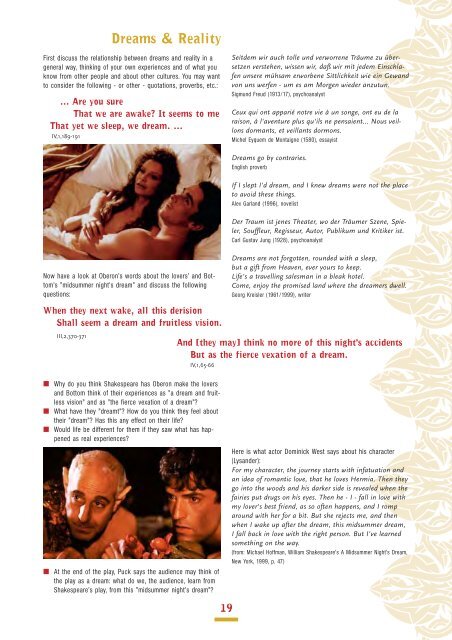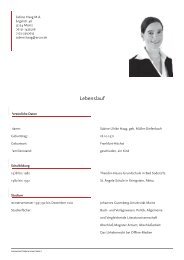Redaktionelle Leitung Sommernachtstraum - Sabine Haag - Text ...
Redaktionelle Leitung Sommernachtstraum - Sabine Haag - Text ...
Redaktionelle Leitung Sommernachtstraum - Sabine Haag - Text ...
Erfolgreiche ePaper selbst erstellen
Machen Sie aus Ihren PDF Publikationen ein blätterbares Flipbook mit unserer einzigartigen Google optimierten e-Paper Software.
Dreams & Reality<br />
First discuss the relationship between dreams and reality in a<br />
general way, thinking of your own experiences and of what you<br />
know from other people and about other cultures. You may want<br />
to consider the following - or other - quotations, proverbs, etc.:<br />
... Are you sure<br />
That we are awake? It seems to me<br />
That yet we sleep, we dream. ...<br />
IV,1,189-191<br />
Seitdem wir auch tolle und verworrene Träume zu übersetzen<br />
verstehen, wissen wir, daß wir mit jedem Einschlafen<br />
unsere mühsam erworbene Sittlichkeit wie ein Gewand<br />
von uns werfen - um es am Morgen wieder anzutun.<br />
Sigmund Freud (1913/17), psychoanalyst<br />
Ceux qui ont apparié notre vie à un songe, ont eu de la<br />
raison, à l'aventure plus qu'ils ne pensaient... Nous veillons<br />
dormants, et veillants dormons.<br />
Michel Eyquem de Montaigne (1580), essayist<br />
Dreams go by contraries.<br />
English proverb<br />
If I slept I'd dream, and I knew dreams were not the place<br />
to avoid these things.<br />
Alex Garland (1996), novelist<br />
Der Traum ist jenes Theater, wo der Träumer Szene, Spieler,<br />
Souffleur, Regisseur, Autor, Publikum und Kritiker ist.<br />
Carl Gustav Jung (1928), psychoanalyst<br />
Now have a look at Oberon's words about the lovers' and Bottom's<br />
"midsummer night's dream" and discuss the following<br />
questions:<br />
Dreams are not forgotten, rounded with a sleep,<br />
but a gift from Heaven, ever yours to keep.<br />
Life's a travelling salesman in a bleak hotel.<br />
Come, enjoy the promised land where the dreamers dwell.<br />
Georg Kreisler (1961/1999), writer<br />
When they next wake, all this derision<br />
Shall seem a dream and fruitless vision.<br />
III,2,370-371<br />
And [they may] think no more of this night's accidents<br />
But as the fierce vexation of a dream.<br />
IV,1,65-66<br />
■ Why do you think Shakespeare has Oberon make the lovers<br />
and Bottom think of their experiences as "a dream and fruitless<br />
vision" and as "the fierce vexation of a dream"?<br />
■ What have they "dreamt"? How do you think they feel about<br />
their "dream"? Has this any effect on their life?<br />
■ Would life be different for them if they saw what has happened<br />
as real experiences?<br />
■ At the end of the play, Puck says the audience may think of<br />
the play as a dream: what do we, the audience, learn from<br />
Shakespeare's play, from this "midsummer night's dream"?<br />
Here is what actor Dominick West says about his character<br />
(Lysander):<br />
For my character, the journey starts with infatuation and<br />
an idea of romantic love, that he loves Hermia. Then they<br />
go into the woods and his darker side is revealed when the<br />
fairies put drugs on his eyes. Then he - I - fall in love with<br />
my lover's best friend, as so often happens, and I romp<br />
around with her for a bit. But she rejects me, and then<br />
when I wake up after the dream, this midsummer dream,<br />
I fall back in love with the right person. But I've learned<br />
something on the way.<br />
(from: Michael Hoffman, William Shakespeare's A Midsummer Night's Dream,<br />
New York, 1999, p. 47)<br />
19





